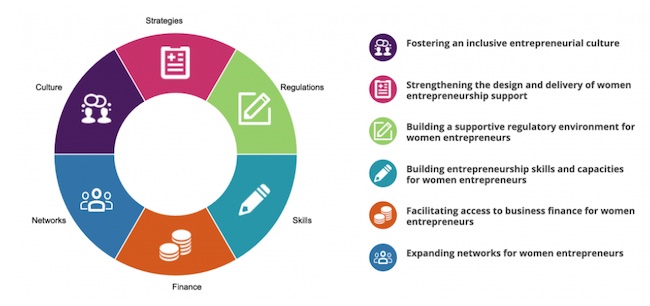Inclusive Entrepreneurship The Missing Venture Founders
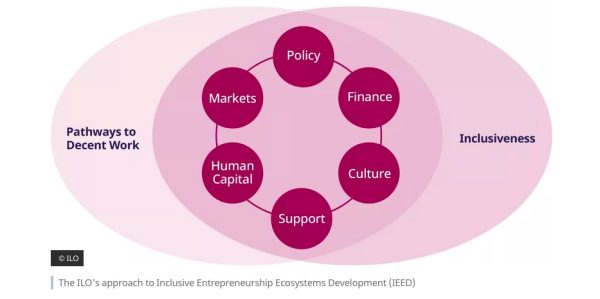 Inclusive Entrepreneurship: There is a massive potential for startups created by women, young people, seniors, immigrants and racial minorities as well as people with disabilities, those with low/no income or without wealth, or in rural areas—creating opportunities for underrepresented groups in the business world. It recognizes that diversity and inclusion are not only moral imperatives but also essential drivers of economic growth and social change.
Inclusive Entrepreneurship: There is a massive potential for startups created by women, young people, seniors, immigrants and racial minorities as well as people with disabilities, those with low/no income or without wealth, or in rural areas—creating opportunities for underrepresented groups in the business world. It recognizes that diversity and inclusion are not only moral imperatives but also essential drivers of economic growth and social change.
Inclusive Entrepreneurship
Those who face disadvantages in the creation of new ventures may be confronted with more than one obstacle. Many are unnecessarily thwarted in their efforts to create and build new ventures.
Indeed, as Kurt Hahn1 the educator who developed ‘experiential learning’ and founder of Outward Bound said, “Your disability is your opportunity.” He was a man who also stressed the importance of “an enterprising curiosity, an undefeatable spirit, tenacity in pursuit, readiness for self denial, and above all, compassion.” Not all of these traits are regularly featured by people who research or write about entrepreneurship. However, in a truly inclusive society, they are.
As the OECD points out, “If all societal groups were as active 30-49 year old men in starting and managing a new business, there would be an additional 34.1 million early stage entrepreneurs in the OECD. Nearly three-quarters of these ‘missing’ entrepreneurs are women and cost economies in missed opportunities for job creation, growth and innovation.” Seen from a national economic perspective this is absolutely correct. However, from a cultural perspective, the social and personal disadvantage is huge and cannot be statistically measured.
The ILO rightly says that, “the success and ability of entrepreneurs to thrive and create jobs are influenced by a complex network of interrelated factors – including the overall business and policy environment, the availability of finance and required business development services, the level of human capital, the prevailing entrepreneurial culture, and the accessibility and functioning of markets.” For significant change to occur means that all those involved need to take a systemic view of the issues, even though their focus may be on a single component of what is getting in the way.
The Missing Venture Founders
In my opinion, the factors that lie in the way of inclusive entrepreneurship are very diverse and many people are subject to more than a single disadvantage to entrepreneurship. For instance, they might be female founders and have a disability. Equally, they might have low credit-worthiness and no funds available from family and friends.
The missing entrepreneur might equally be the person who says, “It is a great idea, but nobody would believe that I could turn it into reality”. Character, circumstance or cultural conditions, are just as strong barriers to venture founders as the impediments so often labeled by the pundits and pollsters: lack of capital (even though only 0.05 percent of startups are funded by venture capital), the economic environment, the ‘government’ (rules and regulations), lack of support, risk aversion/fear of failure, procrastination (“I’ll do it when…”), but the fact is that small businesses make up 99 per cent of all US firms.
As I continue to build the Mission Driven and Purpose Capital Directory—USA, I am regularly amazed at how the number of these focused capital firms are increasing; so far, I have listed well over 200 of them. There are also increasing numbers that focus on female founders, Latino/Black founders, founders with a disability and other under-served members of society.
It’s not just money. There is a massive amount of help and support for those who want to start a business, as many parts of this site describe: search for the help you want: very likely you’ll find it on Venture Founders. The help is forthcoming from Federal Government, State and local administrations, national and community nonprofits, educational institutions, as well as commercial sources and many willing mentors and helpers—just ask. People with disadvantages or disabilities tend to be less able to access these sources of help, but I’m pleased to day that the number of focused organizations are both growing in coverage and increasing in number.
Startups by Women
Female founders have in the past found starting a business to be fraught with obstacles that their male counterparts faced to a much lesser degree. Few people castigated male entrepreneurs by saying that they should be at home with the kids, or that they were neglecting their household responsibilities. Though many men were turned down by investors and lenders, I doubt that it is ever on account of their gender.
Male entrepreneurs own fifteen million of the small businesses in the United States, and by comparison, perhaps surprisingly, female entrepreneurs own some ten million. Inclusive Entrepreneurship is benefiting female founders. About 40 per cent of companies with a female founder performed 63 per cent better than their counterparts with all-male founding teams. However, only 53 per cent of American startups have at least one woman in an executive position in their business.
The Kauffman Foundation reported that in 2021, 4 in 10 new entrepreneurs were women. While the female gender disadvantages to entrepreneurship have been fast disappearing, according to Pitchbook, in 2022, companies founded solely by women garnered a mere 2 per cent of the total capital invested in VC-backed startups in the United States. According to Investopedia, as of 2022 only about 15 per cent of venture capital “check writers” were women.
The Global Entrepreneurship Monitor (2021-2022) reported that women in the United States are highly likely to believe that entrepreneurship is a good career choice (78 per cent), slightly more so than men (75 per cent). Most women also believe that entrepreneurs receive high status (80 per cent) and positive media attention (75 per cent). However, fewer women (58 per cent) than men (69 per cent) believe it’s easy to start a business.
There are progressively more and more sources of startup capital that are focused and/or run by women. I have built and regularly update the Directory of Funding for Female Founders—USA. There are more than seventy finance firms listed.
Startups by Young People
Young people, are statistically assumed to be under 18 and they are generally considered to have insufficient comprehension of entrepreneurship, solely on the basis of age and inexperience. Inclusive Entrepreneurship needs to work better for them. I started my first business at the age of 10. Admittedly it was not long lived, but in 75 years retrospect, I sense that it did have several elements of entrepreneurial characteristics, including curiosity, willingness to experiment, innovative thinking and of course, comfort with failure. With a lifetime of experience, here is what I think about Being an Entrepreneur.
A book I have cherished for many years (it was published in 2005) is in the Future Business Leaders’ SeriesTM. 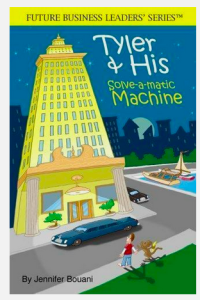 Called Tyler & His Solve-a-matic Machine, I’d even recommend it to adults as an inspiration to start a business.
Called Tyler & His Solve-a-matic Machine, I’d even recommend it to adults as an inspiration to start a business.
Do not be surprised by the fact that age, however, is not really a barrier in itself. It’s more a matter of the cultural conditioning about what kids do and don’t, should or should not do. Have a look at the October 2024 Business News Daily article, entitled ‘Companies Founded by Amazing Young Entrepreneurs‘. Fortune has a piece called, ‘9 Business Ideas for Teens in 2024‘. There are many more articles, if you do an internet search.
I’m a Brit and though I first came to live in the US in 1946, My high schooling was at Bryanston School, a British Boarding School much influenced by Kurt Hahn, and where my interest in outdoor adventure was kindled. We had a weekly activity called ‘Pioneering’, that had us doing weekly physical or social work, both on school property or in local communities. The object was to instill a practical and constructive training towards citizenship, implicit in which is the fostering of the spirit of adventure, with key ideals of self-development, independent thinking, responsibility, resilience, and service to others. Richard Jones, the school’s present headmaster, tells me that entrepreneurship is something he feels particularly passionate about. He says that his aim is to make it more explicit within their academic curricula and to place it at the center of the school’s co-curricular offering. He also told me that he just appointed a full time Head of Entrepreneurship and Innovation to lead the project.
The North Carolina nonprofit, Rising Innovator, has identified five benefits of school entrepreneurship education:
- preparation for an uncertain future;
- development of creativity and collaboration skills;
- demonstration of how to identify and recognize problems;
- resilience building; encouragement to make the world a better place.
Startups by Seniors
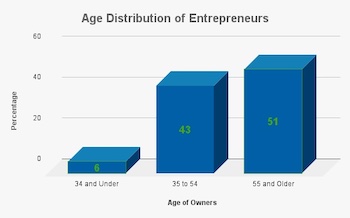
Information drawn from the Census Bureau’s 2019 Annual Business Survey
We all age at different rates, so it is difficult to make definitive statements, and there’s no precise data upon which to rely. However, I started my last business in my late 60s, and I know I am not exceptional. Have a look at Seniorly’s list of the Top 10 Entrepreneurs Over 60, for instance.
The table shows, quite simply, that seniors should not automatically be self-dissuaded from entering the business fray. Since 2020, the percentage of companies founded by people between 55 and 64 years old has increased in the United States, the United Kingdom, France and Germany, (Global Entrepreneurship Monitor). Inclusive Entrepreneurship is obviously working for them.
As an oldie myself, I can say that experience, financial stability and less responsibility, allows seniors more elbow room to create their own business. Maybe as they feel less valued in the world of work, they can be freer to realize dreams they may have been harboring for a long time and reach fulfillment that otherwise might be more elusive. Their work life experience will probably enhance their decision making.
On the other hand, challenges that they encounter may be more daunting than younger people, especially in the tech area. Keeping pace with fast developing digitization can be tough and take longer than for younger people who have grown up in the digital age. However, if the founder has been one who embodies continuous learning, it may provide some pleasure without the same time constraints as would have been the case when younger.
Maybe they’ll encounter ageism among lenders or potential collaborators. However maybe the ripeness of age will result in less confrontation. As with so many people in the helping professions or volunteers, they may find a two-way street when they offer assistance to others along the way. The benefit of giving advice or time inside or outside the venture may be like unintended mentoring for the senior entrepreneur.
Startups by Immigrants and Racial Minorities
Businesses founded by immigrant entrepreneurs created 42% more jobs in America than ones started by their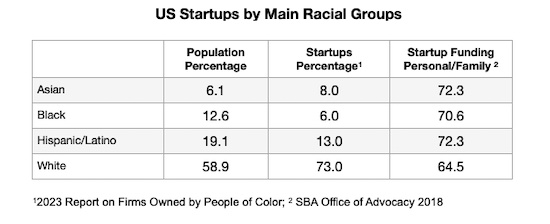 US-born counterparts and 25 per cent of all new businesses in the United States are started by immigrants. Clearly Inclusive Entrepreneurship is working for them.
US-born counterparts and 25 per cent of all new businesses in the United States are started by immigrants. Clearly Inclusive Entrepreneurship is working for them.
Not only that, but the percentages of US startups by race have proportionately changed very significantly over the last few years.
In the 2023 Report on Startup Firms Owned by People of Color, it is reported that only 28 per cent of startups of color, used a financial institution or lender as a source of funding, by comparison with 48 per cent of white-owned startups that did so.
According to the Kauffman Foundation, over the last 25 years, the share of new entrepreneurs who are Hispanic or Latino more than doubled (from 10.0 to 24.2 per cent), as did the share of new entrepreneurs who are Asian (from 3.4 to 7.3 per cent). The share of new entrepreneurs who are Black or African American increased from 8.4 to 10.1 per cent. The share of new entrepreneurs who are white declined from 77.1 to 54.5 per cent. According to the Global Entrepreneurship Monitor (2021-2022), eighty-one per cent of Black people state that entrepreneurship is a good career choice (79 per cent Hispanic, 74 per cent White).
Potlikker Capital is an innovative social justice charitable loan fund that focuses on financial help to BIPOC (Black, Indigenous, and People of Color) farmers in America who operate at the intersection of racial and climate justice.
Startups by People with Disabilities
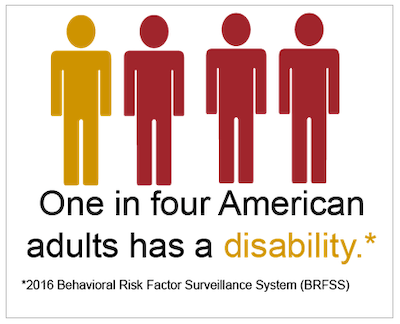 In the US there are already more than 1.8 million business owners with disabilities (American Census Bureau) and that number represents 3 per cent of all business owners in America (2021).
In the US there are already more than 1.8 million business owners with disabilities (American Census Bureau) and that number represents 3 per cent of all business owners in America (2021).
Also, while I describe many ways in which people with disabilities are discouraged from starting a business in my piece on Startup Business with Disability, and the help available in Support for Entrepreneurs with Disability, I describe the ways that such individuals can flourish through inclusive entrepreneurship, as well as how they can access preferential support and assistance.
Nondisabled people and often those already in business are unaware both of the difficulties faced by people with disability, and the advantages that working with them can offer. Without being aware of it, nondisabled people frequently exhibit ableism, but fortunately this discrimination is diminishing.
Startups by People with Low/No Income or Without Wealth
The nation’s roughly 800 billionaires now hold 3.8 per cent of U.S. wealth, according to Americans for Tax Fairness, while the bottom half of American families control only 2.5 per cent (64.3 million families; average family size in 2023 of 2.37 people including only those over 18—that’s about 152 million people (who might be entrepreneurial ‘candidates’). Many people among those 152 million have limited resources and live in rural communities with few opportunities for entrepreneurial support.
while the bottom half of American families control only 2.5 per cent (64.3 million families; average family size in 2023 of 2.37 people including only those over 18—that’s about 152 million people (who might be entrepreneurial ‘candidates’). Many people among those 152 million have limited resources and live in rural communities with few opportunities for entrepreneurial support.
Startups by people with virtually no wealth generally start very small and grow only within the means of their cash flow. There are many ways to start without outside investment or borrowing; it’s generally called financial bootstrapping and it can be a matter of necessity or financial prudence. I have written a founder’s guide of financial bootstrapping, largely based on my own entrepreneurial experience.
There are many other ways to achieve early stage survival of a new venture, that I call small profits and quick returns. The ways do not involve penury or taking undue risk, but rather using all the creative genius of founder mentality to get the cash flowing.
So often a funding source will ask you, “How much money do you need to start the business?” But if you lack credit credibility, then the question to ask is “How little money do I need?” More people with limited or no wealth could get on to the economic ladder if they are encouraged to recognize inclusive entrepreneurship.
Does it sound ridiculous to imagine that unemployment might be a spur to new business creation? I don’t think so.
Startups by People in Rural Areas
 In 2013, the GEM reported that 56 per cent of Americans believed they had the capabilities to start a business, which meant that about 37 million ‘rural’ people between 18 and 64 thought they could do a startup. I don’t have up-to-date data, but it’s likely that in rural areas there are nonetheless a lot of people who still think they could be entrepreneurs. Rural America is much more than farms and barns, but relatively speaking it is less well stocked with support or encouragement to build a business; the startup infrastructure is mostly urban—less than one per cent of all venture capital goes to rural startups, says the Center on Rural Innovation.
In 2013, the GEM reported that 56 per cent of Americans believed they had the capabilities to start a business, which meant that about 37 million ‘rural’ people between 18 and 64 thought they could do a startup. I don’t have up-to-date data, but it’s likely that in rural areas there are nonetheless a lot of people who still think they could be entrepreneurs. Rural America is much more than farms and barns, but relatively speaking it is less well stocked with support or encouragement to build a business; the startup infrastructure is mostly urban—less than one per cent of all venture capital goes to rural startups, says the Center on Rural Innovation.
However, according to the Economic Innovation Group, there was a very steep rise in new business registration applications between 2019 and 2020, and I believe that notwithstanding the negative economic ‘Covid effect’, the rise is likely continuing. Many institutions in rural communities have for a long known that more inclusive entrepreneurship will enhance the overall quality of life in their communities.
If you live in a rural area, you may have abandoned your startup idea too soon. There are many grassroots startup barriers, but more and more facilities and support is available. For example, in my own community in rural New Hampshire, an example is Radically Rural (RR ), a grassroots movement, that aims to amplify collective rural impact by connecting folks with each other and with ideas. RR builds networks of passionate, innovative people willing to share ideas and resources to strengthen their small communities across the country. Small town entrepreneurship presents almost as many challenges as those faced in the countryside, but there are many ways to confront them.
Diminish Entrepreneurial Disadvantages
Who are the people who can diminish entrepreneurial disadvantages? Many people—including individuals, institutions, government and industry. The US Federal Reserve found that more than half of Black-owned businesses were turned down for bank loans, a rate twice as high as white business owners. That’s a good place to start: banks. But it’s not just prejudicial behavior by organizations. Here are ten groups of people who can take action to diminish entrepreneurial disadvantage:
- Individuals who consider themselves at a disadvantage to start a business;
- Those with authority to make economic/social improvements, but who are ignorant of disadvantages;
- Institutional buyers of goods and services;
- Providers of services to the disadvantaged;
- Elected public office holders and civil servants at all levels from Federal to town government;
- Financial institutions, especially credit unions, mutual, S&L, CDFIs, co-op and public/community banks;
- Nonprofits devoted to groups of people facing economic disadvantage;
- Educational institutions—schools, colleges, and further education can develop entrepreneurial spirit;
- Providers of entrepreneurship services, eg networks, coworking spaces, business incubators;
- Necessity entrepreneurs—those who believe that decent or desirable livelihood employment does not exist.
This is not an exhaustive list, but these ten groups could transform the situation, especially through collaboration in their communities and between groups. This is not to belittle the huge progress that has already been made to include the neglected members of society.
I would bet, with no data to support my assertion, that the first group of people on my list above—individuals who themselves are at a disadvantage to start a new venture—are the strongest to change the situation and that their incentive is the greatest.
Startup for Good
1. Hahn developed a set of seven principles to guide education at his first boys school, Salem, in Germany, an then applied to his new school, Gordonstoun in Scotland, after the start of WWII: Give the children the opportunity for self-discovery; Make the children meet with triumph and defeat; Give the children the opportunity for self-effacement in the common cause; Provide periods of silence; Train the imagination; Make games important but not predominant; Free the sons of the wealthy from the enervating sense of privilege.



